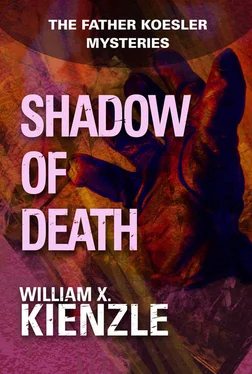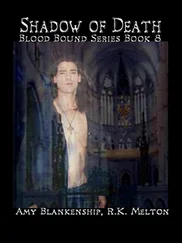Koesler squeezed through the crowd to the stairs and went up to his room.
He couldn’t get over how cold it was. It had been cold ever since he had arrived in Gurteen, a damp cold. Was it the Irish weather in general—or a geographic peculiarity of this village in particular? Whatever, he was cold.
He had brought two pairs of pajamas . . . and decided to wear them both to bed. Even so, he shivered under the covers. And in his head beat the inexorable rhythms from the pub below. He tried to recall how it had been when he had been a young lad going to sleep upstairs over the juke box in the Tamiami, with the Baker streetcar clanging and heavy trucks rumbling up and down Vernor. He had been able to sleep then; why not now?
He tried very hard. But, even so, shortly after the 11:00 p.m. closing time, he could hear young Tom Murray alternately shouting and pleading into the microphone downstairs: “Time, now lads! Are you right there now, lads? It’s way past the time! Time, please! We gotta go now, lads! You, there, Paddy; are you right there, now? It’s way past time!”
And on and on.
Finally, Koesler did fall asleep. But before he did, he concluded that his ease in sleeping through the din of Vernor had been attributable to young ears.
It made as much sense as anything.
8.
His eyes snapped open as if waking from a nightmare. Astonishment fought with drowsiness for dominance.
The heavy bell sounded as if it were in his room. It almost was.
Koesler looked at his watch. 6:30. The bell kept ringing. Although he had no hangover, he knew he was about to get a headache. He caught up with the clangs at five, and then continued to count. The bell tolled an incredible twenty-four times, his head reverberating at each ding and dong. He was willing to bet the parish mission would have a grand attendance for morning Mass. If nothing else, the entire village of Gurteen was either wide awake or deaf.
Gradually, he tried to organize his thoughts.
Thursday.
Three days till his return to Dublin and the ecumenical service and the subsequent return to Detroit.
Three days of relaxation.
Last night, he had planned not to rise before nine. However, St. Patrick’s bell had proven to be modified rapture. The rapture was that he now had more of the day to enjoy. The modification was provided by that infernal noise. His ears were still ringing from the din.
As he began to shiver his way out of bed—what made Gurteen so blasted cold!—the clanging put him in mind of an incident many years before, when he had been assigned to an inner-city parish.
It was Holy Saturday, the day before Easter. The pastor had excused him from the vigil service scheduled to begin at 11:00 p.m. He was grateful. He was tired from hearing all the confessions, and wanted to turn in early. He read till nearly eleven.
The ushers at this parish had been instructed to ring the church bell at the moment Mass began on Sundays and Holy days. No one had ever informed them that if Mass began at midnight—as it would in the Easter Vigil—they should not ring the bell. One would have assumed that to be common sense.
However, one would have been wrong. At midnight that Saturday night, or Sunday morning, the vigil service ended and the first Mass of Easter began. And some usher laid on the bell.
Koesler had awakened in much the same emotionally shattered state as he had this morning. And then the phone had begun to ring. The first caller had given Koesler the unexpected opportunity of using a minstrel joke he had almost forgotten.
“Why is the bell ringing?”
“Because someone is pulling on the rope.”
“Oh.”
She had seemed satisfied.
Perhaps Gurteen lay in some geological fault. There must be some reason why it was so bone-numbingly cold in early May.
By this time, Koesler had shaved and was looking with misgivings at the bathtub. No shower. And this had to be the coldest bathroom in Western civilization. He filled the tub with the hottest water he could tolerate, shed his two pairs of pajamas, and hopped into and under the water.
The problem was that he had to lift parts of himself out of the water in order to wash. The hot water evaporating from his body simply made him colder. Now he understood why the bathroom was painted blue: It matched the color of any naked body trapped within its confines.
Coffee and toast and aspirin in the pub’s ample kitchen got things off on a more equable footing. Tom Murray was not yet up and about. So Koesler leisurely and quietly pondered the day. He was getting an earlier start than he had originally intended. Why not, then, take a slightly longer trip?
He consulted his map and traced the route that led south of Galway Bay to the Burren, to where, as well as to barren Connemara, the English had herded huge clusters of the Irish to survive if they could, but more likely to die.
Koesler had long wished to see for himself this starcrossed region. And, since St. Patrick’s bell had gifted him with an unexpectedly elongated day, and since the sun was warming this into a more conventional spring morning, he decided to do it. Figuring the distance between Gurteen and the Burren, he concluded the trip would require no more than two-and-a-half hours. Which should bring him to the Burren before noon.
Driving was simpler today. There was very little traffic, especially on these back roads. There was little need to shift gears except between third and fourth on the hills, and Koesler was beginning to get accustomed to driving on the left. He thought he might even have some initial difficulty making the switch back to the right when he returned to the States. Nevertheless, he hoped he would not get caught in any heavy or problematic traffic today. After only a couple of days of Irish-style driving, he did not feel all that comfortable with it.
Still slightly ill-at-ease with his turned-about Escort, his mind wandered back to auto problems he had experienced in the distant past.
He winced as he recalled the time he had hit a parked car—the stupidest thing, he thought, a driver could do. That he could remember it so clearly made it the more painful. There had been nothing wrong with the weather; it had been a bright, clear summer day. The culprit, he defensively rationalized, had been his breviary, which he had that morning placed on the passenger side of the front seat. The breviary was, as usual, packed with notes, phone messages, and clippings—his office away from home. As he made a left turn, the prayer book began to slide off the seat. Horrified to think of the mess of papers that would litter the floor if the breviary fell, he reached for it.
When he was able to look up, the parked car was only a few feet away, too close to stop in time.
Nobody had been injured, but the front of his car looked like a pug dog, while the rear of the other car resembled an accordion. And he had spent the next several weeks getting the mess straightened out.
Ballyhaunis. A jog to Highway N83, a trunk road, better than the one that had led here from Gurteen.
Then there was the time he had attended an evening movie, leaving his car parked on Michigan Avenue in Dearborn. When he came out of the movie house, his car was nowhere in sight. The Dearborn police, however, knew where it was. They took him to visit his car as it lay dormant in the fenced-in lot of a service station.
This time it was his fate to be the victim of a driver who had run into a parked car. And this time it was the rear of his car that was accordion-pleated.
The irony was that the lady who had driven her car into his had done so deliberately—in an attempt to commit suicide. She had done a very good job of wrecking both cars, but a very poor job of suicide. A few bandages had repaired her. His car had been laid up for months.
Читать дальше












